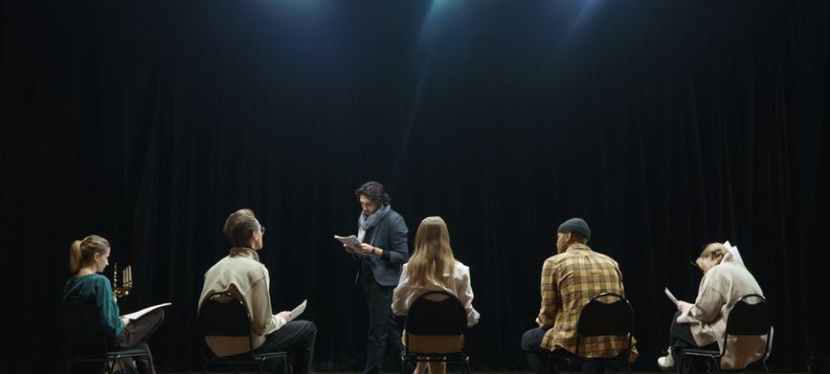One of the longest and most rewarding journeys I’ve taken in life is my journey through the world of theatre*. My first experience in theatre actually started by putting on plays in my backyard as a kid. I rounded up my sister, brother, and a couple of the neighbors and we enthralled our parents with a stirring rendition of The Three Billy Goats Gruff – written, directed, and produced by myself. I may have also given myself the lead role. Yes, it was a vanity piece.
Since then over the past half-century, and a little more, I’ve acted and directed many plays primarily for community theatre. Dramas, comedies, musicals, you name it and I’ve done it. Along the way I’ve learned a few things both as an actor auditioning for a role and as the director selecting actors for roles that I would like to share with you.
I have to stress that the tips and suggestions that follow are my ideas and they won’t apply in every case. For example, I don’t have enough experience in professional theatre to be knowledgeable in how most of them handle auditions. But I have auditioned for several amateur groups and I usually get cast. So I hope that you’ll find them helpful in preparing for your next audition.
First Things First
Before deciding to audition for a show check your calendar!
Most shows will rehearse between 6 – 8 weeks, sometimes more for a musical, and depending on the role you are cast in you may need to be at rehearsal 3 – 4 times a week for that period. Be realistic, can you put in the time necessary to be in the show? Most directors at the community theatre level will expect actors to have a few conflicts due to work and family but they will expect you to be available every night for the last week or two leading up to a show. Likewise, if you have a big vacation or business trip in the middle of the rehearsal period that will take you away for a week or more understand that this will likely mean that you won’t be cast for the lead – no matter how talented you and perfect for the part you are – if you are cast at all.
Typically, you will be asked about conflicts at the audition. Be honest, I have seen people cut from shows during the rehearsal period because they could not live up to their commitment in terms of availability. It isn’t pretty and it isn’t fair to your other cast members. Putting on a show is a team effort. If one or more people are consistently missing the entire production suffers.
Know the Rules
Though auditions are similar from group to group there are often differences. The group putting on the show will usually have expectations listed on their website, Facebook page, etc. for the audition process listed. Read them and follow them to the letter.
Know the Show
If at all possible try to obtain a copy of the script and read it ahead of time. In some cases groups may have reading copies available to lend – but don’t count on this. At the very least go online and find a synopsis and list of characters.
Know Yourself
After reading the script, be honest with yourself, is there a character that you could see yourself playing in the script? If you are auditioning for a musical is the part you want in your vocal range? Do you have the special skills that may be required of the role (tap dancing for example)?
The good news is that most if not all community theatres have policies of inclusivity when casting so opportunities to be cast have never been greater. This used to be called “color-blind” casting in which race does not usually play into selection of the character unless race is a theme of the play (for example, you are not likely to see an all white cast for Raisin in the Sun). Gender blind casting has recently come to the forefront as well with some groups but not most. Do not assume that this is the case for any show you are auditioning to be in. Sometimes the playwright has put restrictions on who can be cast, most famously Edward Albee and Who’s Afraid of Virginia Woolf?, or a director feels that “gender bending” would impact the message of the play. The norm still is that men should audition for male roles and women for female roles. However, in my opinion, it doesn’t hurt to ask about this.
Race and gender aside I believe you will still find that most directors will stick to other qualifications, such as age, when casting.
You are now ready to go to the audition!
At The Audition
Remember that the audition is essentially a job interview. So basic rules apply:
- Be on time if the audition is by appointment. If the audition is during a block of time – 7:00 p.m. to 9:00 p.m. for example – don’t arrive at 8:45 or later and expect to be given a try-out.
- Be polite.
- Dress appropriately. You don’t need to wear a business suit, but be sure to wear loose fitting clothing that doesn’t restrict you movements. I prefer to dress in neutral colors so that the director is focusing on my movement and face instead of my outfit. Some people recommend dressing as you think the character you are audition to be would. I do not. Your idea of how the character would dress most likely will not match the ideas that the directing staff have. Most directors are looking for actors who will be flexible during the rehearsal process, not actors who are already set on how to interpret the character.
- Be respectful of other actors who are auditioning. Many groups have open auditions in which everyone watches everyone else’s audition. Be quiet and attentive when you are not on stage.
- Be ready to take risks. Too often I will see people trying to copy another person’s performance during an audition. Try to give the directors something unique about your performance that no one else did. Especially if there is a large group auditioning for the same role. You want to stand out at an audition, not blend in!
Remember this is your time to shine. You need to put aside all fear of failure and go for it! If you can’t speak up and move in front of a relatively small group how can the director trust that you will before a sold out house on opening night?
After the Audition
I think that the hardest part of an audition is afterwards when you are waiting to see if you got cast. Hopefully, the group you auditioned for told you how you would be notified if you are cast and if you are not.
In Conclusion
If you are cast in the role you want, congratulations! If you are not cast in the role you wanted or worse yet not cast at all please don’t let this discourage you. Auditioning is a skill and most people do not get cast in a leading role their first time out. Keep auditioning and you will get better at it.
I hope that these tips help you get the role you want. There really is nothing quite like being in a show and I have found a lifetime’s worth of pleasure and satisfaction in community theatre. I’m sure that you will, too.
You can find other tips for auditioning on the web, of course, and I also recommend finding a copy of Audition by Michael Shurtleff (ISBN 9780553272956). It’s a great guide and many consider it the “bible” of auditioning.
Break a leg!


